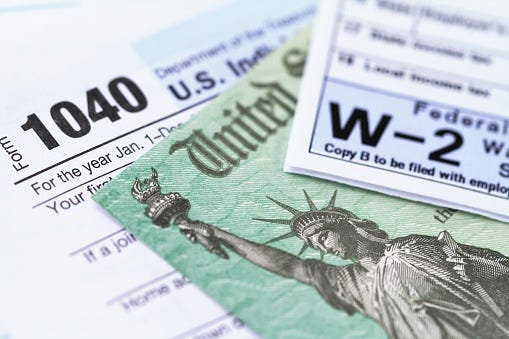Those who are least protected with fewer assets need to tackle their financial means more seriously. These are the people who cannot afford to wait.
On the other hand, those who spend hundreds of thousands on lawyers, accountants, services, consultants, fiduciaries, and supervisors don’t have nearly as much pressure yet still prioritize this seemingly boring practice of estate planning because they know they need to.
Good rule for life: If you can make anything fun, or at least attempt to make it enjoyable by being curious and proactive, then you will always succeed. It will also multiply your wealth. After all, the more we enjoy something, the better we are at it.
Taking on debt isn’t dangerous per se as long as you have a realistic purpose and mission for the future, ideally with what you borrow appreciates. Besides cutting expenses, working longer or raising money somehow, borrowing is one of the most efficient ways to build wealth, as long as it is responsible and moderate. With the recommended 20% downpayment on a home, there are very few cashed-up buyers, ~10% of Americans who don’t take on a mortgage and it may not be prudent always anyway if the purchase price is over 20% your net worth.
Without the option to refinance or take out a 30-year fixed rate mortgage when interest rates are at rock bottom, only a slim percentage of people would be able to afford a home and build equity inside of it.
The wealthy limit ‘toxic debt’ since they value their years of hard work, sweat, and tears. They know it’s easier to lose it than gain it back. They take on ‘healthy debt’ or leverage to capitalize on opportunities instead. Coincidentally, the top 10% and above also tend to hold the largest cash cushions, 6–12 months of living expenses even when there are negative interest rates to take advantage of unexpected buying opportunities and dips such as during the current geopolitical event when expensive speculative stocks are trading at a 50–80% discount.
Those swamped in debt that can’t get out of it took on excess debt to purchase toxic goods such as luxuries to impress others besides themselves. It’s more likely to regret a handbag purchase than a business loan. This has caused an imbalance to their FCF and asset allocation strategy, making it harder for them to dig themselves out of the hole they created. These people also tend to be the least financially literate and only pour their time and energy into 1 income source. Last but not least, it’s common to hear them say they never have the time. BTW, everyone has time for something. It’s your priorities that count.
Once you become financially independent, have several passive income streams and aren’t living on eggshells during a bull market, you not only become more serious about every penny you make and start to really pay attention to your spending like a hawk but your mindset is geared for the future. The present has already passed.
Although living in the present is advised, when it comes to our financial health, thinking 2 steps ahead, or in this case, 2 decades plus ahead will keep you best afloat.
As they say, if you tackle the challenges head on first, you will be best prepared later on and know what to expect. We may not know what we don’t know but we know there are some certainties in life: that things will mess up eventually.

Get On It Now
On the other hand, the wealthy tend to be the most uptight about having their will, trusts, tax shelters and havens, durable powers of attorney, beneficiaries set, assets locked up and divided appropriately for smooth sailing once they’re gone.
Although the best businesses are usually the most boring and plain-vannilla ones, this isn’t why the wealthy ponder death. Time is of the essence and they don’t skip the truth. The earlier you can understand our time isn’t infinite, the more appreciative you will be of everything today.
Boring things such as estate planning isn’t attractive, especially since it takes enormous amounts of time and capital yet it makes today easier, a mindset you must cultivate earlier than later.
Estate planning for the wealthy isn’t seen as a must-to-do, it’s just part of life. Instead, they prioritize it themselves because to be classified as ‘wealthy’, you most likely own a business of some sorts and what are business owners searching for the most? Tax advantages, depreciation, and tax write-offs to earn and keep more!!
On average, Americans pay 8x more tax than multinational corporations and today more than 50% of multinational corporate profits in tax havens and shelters.
Business owners are strategic and get their time back, the real financial freedom. It’s not about the money, it’s in time. They find every possible way to LEGALLY bypass the corrupt tax system to pay the least amount possible which starts with these handy dandy documents and assistants.
As the classic saying goes, if you put in the work, the work will work for you. In business, that couldn’t be more accurate. It’s not rocket science, it’s just numbers.
The percentage of Americans who still aren’t invested, less or more than 30%, and aren’t financially literate, ~60% is astonishing yet believable. No wonder the lower to middle class pay the most taxes than the top 1% richest and have a harder time than ever before rising up the income ladder due to hyperinflation, rising costs of education and healthcare. They haven’t cracked the code and aren’t willing to put in the work on the sides to set themselves up for success.
They have their wealth-building strategies messed up. It’s not about how much you make, rather how much you keep. A higher-income can get yourself into a dangerous situation since you fall more easily into lifestyle inflation creep.
Hiding your paycheck from yourself and working overtime on the side on diverse non-correlated streams of income such as on a blog or e-commerce business will set you up on a sturdier path and propel your earnings potential in the process far better than sticking to just 1 income, the easiest, unsafest path.

Plan for the Worst Hope for the Best
When we think of the core financial documents and statements we need to monitor and keep tabs with routinely, we tend to stick to the surface. They tend to include our balance sheet, income statements, credit reports and monthly statements, passports, driver’s license, brokerage investment account statements and accounts, passwords, Form 1040/Form 1099, certification of ownership, birth certificate, diplomas, etc.
While all of these are vital to stay alive, they won’t necessarily help you scale your wealth. The assets you’ve grown and those that have appreciated on the other hand are 10x more valuable and cannot be replaced. They are found in other documents that are disclosed and not talked about or brought up due to fear, procrastination, and forgetfullness.
Anything you own, you must think to the future about protecting and can designate who from your family (spouse, bro/sis, mom/dad, etc.) should manage them later on.
This isn’t favoritism, it’s finance.
This planning is all found inside a will, revocable/irrovocable trust, and insurance (whole, universal, variable) plans designating, planning, preparing, and tieing a beautiful bow on your life.
Beyond the reason for safeguarding assets in the future and not letting Uncle Sam rob us of our earnings in a trust and will, is to avoid a heck of a lot of fees, time, and taxes, the longest ongoing liability we will ever face later on.
Once you hit an income of $215k+ or more which puts you in the marginal tax bracket rate of ~35%, you are already giving up a substantial amount of your money that could be equivalent to 3 + income sources given to the government. The last thing you want to do now is pay estate tax, transfer tax, or gift tax on your inheritance.
The basic rule of U.S. income tax is that businesses pay tax on their net income and individuals pay tax on their gross income. Businesses can deduct their expenses and pay tax on the profit from their net income and deducted expenses while an employee pays tax on their full salary. No wonder the wealthy have their financial engineers, cash cushions, lawyers, litigators, accountants, investors, and chief of staff in order otherwise owning a business wouldn’t be worth it if it was more trouble. The more you make, the more you pay in taxes. That system is reversed when owning a business.

Double Trouble
The more assets you own and take care of including family above all, the less trouble you will have when you are already dealing with trouble. It’s saddenning to realize people are simply willing to delay their financial freedom, peace, and sanity for short-term gratification such as a high paycheck or movie night today. I guarantee you, you will feel 10000x better if you set up your will and trust.
When you are less wealthy, the more you must prioritize this since less means more to you. The government can take 50% of Bezo’s net-worth and he will still be on Fortune 500 richest list but if the government took 50% of your net worth? I can’t imagine.
Extremely rare yet if unprepared, the real wealthy not lottery winners can afford to hire anyone to defend them in court without a will in probate when it comes down to splitting their assets. Others cannot gamble their lives like that. More risk more return but not with your livelihood on the line.
As a refresh for those who are already behind, when a family member dies without a will it is called dying ‘intestate’. This requires your estate (assets -including your residence(estate), go to court since none of the assets are already split up in an irrevocable trust.
Whenever we hear court, we think time and money. The last thing you want your beneficiaries and loved ones to deal with is more hassle when you pass. Losing you is enough so give them a piece of mind and organize your assets to easily avoid thousands in legal fees, not to mention having to hire a lawyer. It is absurd that the government can take a bulk of your assets if you don’t have the means to go through probate. No one should have to risk their career and life to have to go through probate and struggle to obtain their own assets back.
Probate is a true hassle that is in your hands to avoid. Although time is more precious to the wealthy than money since they can simply throw money to deal with any fees or trouble, for the less fortunate, they canot afford risking their time especially since the majority of them earn pay-check-to-paycheck or minimum wage.
The more people you need to support, the most reliable, durable, and long-term insurance plan you need to set up. Ban term-life insurance. If you love them, you don’t just care about them living a fruitful life today, but also when you’re gone.
Sadly, it’s all on our calendars. We aren’t immortal and need to prepare for the worst, hope for the best. If you don’t want the government stealing all your assets once you pass and end up using it for who knows what, get cracking on it.
While the richest Americans keep every penny of their hard-earned portfolios, the poorest Americans shouldn’t be the ones giving up the most and keeping none. Unfortunately that tends to be the case.
It’s not a surprise that under Google’s most searched results for, “how to set up” something, the results that populate include, “how to set up an Apple watch”, “Tesla programmable screen”, “a Robinhood account” and “a lightbulb” as the top searches. No where in sight until the 4th page of results is there something related to our financial wellbeing and support. On the 4th page, there’s finally a question posed, “how to set up a brokerage account”!
In a nutshell, that’s American’s priorities.
We are focused and distracted by the wrong things. No wonder Americans struggle and are in a financially destructive place once loved ones pass. The government puts them into misery since they failed to prepare, so they prepared to fail.

How to Get Started ASAP
If you don’t have a will or trust set up, your first priority is a will. Don’t walk, run to your computer or fancy MacBook you spent instead of getting started earlier.
Compared to a trust, a will or last testament is a legal document that generally covers how you want your assets distributed and inherited to once you pass.
A trust is much more complex and suggested for those with diversified assets, multiple income streams, inheritances, beneficiaries, businesses, and a net worth over ~500k. It is a legal arrangement as well that requires a solicitor, lawyer, and a couple thousand in fees allocated to set up.
Hence the name, the trust transfers the assets in the name of the trustee to manage them. Inside collectibles to antiques, properties (estates) to investments can be included. Anything that they once owned is split up to their choosing. This is called estate planning. It involves estates and any assets that grantor/trustor/custodian holds that are distributed and organized for the beneficiares.
A will can be set up online at any reputable site such as Freewill.com and imemdiatley you’ll feel better once complete. Don’t take this process lightly. Arguably, it is probably more important than anything.
With a trust, it requires months in paperwork, preparation, meetings, and record keeping that many aren’t willing to deal with yet it is well worth it for those who want to avoid death tax up to 40% on an estate if it is above the estate threshold.
As with a trust, you can avoid probate as long as you have joint owners and or beneficiaries. The will makes the process of transferring assets easier, but not as convenient as through a trust. It is more affordable than a trust since it doesn’t offer these added benefits.
Additional Trust Types
This may go over your head a bit so bear with me. It’s still important to be aware on what offerings are out there as you progress through life.
I’m fully confident as a BoiledNotFried reader, you will build yourself a valuable nest egg that a trust and these additional plans will be top of mine one day unless of course, you prefer the government to take your holdings which is much easier but not strategic.
If you don’t have a will, don’t even bother with these for now. Run, don’t walk to start one ASAP.
SLAT
A SLAT, a spousal lifetime asset trust is typically structured as grantor trusts for income tax purposes meaning the donor pays the income tax liability on the earnings rather than on the trust itself. The major downside to passing down your assets to your spouse is if you divroce, they will end up keping your assets since the transfer of the assets to the SLAT is irrevocable and permanently removes the assets from the donor’s estabte. Since divorce rates are over 50%, be wary about this plan and make sure you confirm your partner isn’t fully financially dependent on you just for your money before they run off with it.
If you have set up an estate planning attorney and believe or currently own an estate that is above the estate tax threshold, currently at $12m for individuals and $24m for couples which means a death tax of 40% upon death, it is well worth it.
Dynasty Trust
This is a long-term trust created to pass wealth from generation to generation-similar to a step-up basis or grandfather plan without incurring transfer taxes. Such taxes include the estate and gift taxes or generation skipping transfer tax that once again, take up a larger percentage of your estate, the wealthier you are.
Grantor Retained Annuity Trust (GRAT)
A GRAT is an irrevocable trust that allows you to lock in assets for a period of time, usually two to twenty years, with the hopes it’ll appreciate over the time of the trust.
During that period, the grantor (the person who added the assets to the GRAT) is paid a regular income, hence the capital A Annuity. The annuity income is calculated using the Section 7520 Interest Rate — designated by the IRS each month — when the trust is created.
At maturity or at the end in this case, the remaining amount goes to the beneficiary, whether that’s a child or another trust (including another GRAT), and is exempt from estate taxes. If the assets appreciate at a higher rate than the 7520 interest rate, then the excess appreciation is what’s passed on to the beneficiary, estate tax-free.
Dizzy yet?
Don’t be. This should be fun or else everything will seem miserable.
You are in control!
What is the point of all of this?
Ultimately it is to protect your benefiiciares and loved ones, secure a smooth transition and inheritance of your precious assets upon your death, not let the government rob you of your invemstnst, and avoid TAXES and FEES, lots of them.
Spend a little now to save a LOT later.
And while it might seem morbid to discuss end-of-life wishes and death, it is the best thing you can do for your loved ones to confirm they will be safe and sound. Better now than later. Trust me.

Control It
Have I lost you yet?
Don’t lose it. We’re not done.
Once you’ve done the bare-minumum, there’s still more protection.
Instead of dreading the experience, be appreciative these options are in store for you to provide a safer inheritance transfer process for your loved ones. If you don’t care where your assets go, well, the government will be more than happy to take it since the wealthy aren’t their first targets anymore.
Once you are a parent, you have an enormous responsibility on your shoulders. Having kids shouldn’t be taken lightly. Not only do costs skyrocket as it becomes one of the most costly financial decisions of your adult life, up to $250k per child up to age 18 and for an Olympian, up to $500k to raise one, but time and energy too. Time = Money.
Expect tuition costs and health care costs to baloon within the next few years due to inflation. They are only going up. Education is one of the few industries that can simply continue to raise costs and will forever attract demand for as long as we know it.
I cannot image how much a 4 year degree will cost in a decade. It’s already through the roof and retirees have been paying off their student loans for 70 years now!
With more kids under a roof, requires a larger home with a higher purchase price, more property taxes, and higher maintenance bill. This all must be factored in but above all, don’t forget about your sanity, health, and security which starts with life insurance.
There are various options for health and life insurance to choose from but one incentive to remember is that the rates and benefits become more expensive and less attractive the older you get. One of the ultimate benefits of working for an employer is tax-advantaged retirement accounts, health care benefits from dental to medical, disability, PTO, parental leave, bonuses, and a community that are all precious as a working parent. Once someone relies on you or more formally, becomes dependent on you, your life must be secured even more.
For ultimate rewards and a decent cash payout, sticking to universal life insurance is recommended for a cash payout and death benefit for your loved ones. Alongside this, in your later years, once you head for retirement, an annuity will offer a steady stream of payments as supplemental income alongside SS, your investment portfolio, and retirement accounts to help keep you afloat.
The earlier you can prepare yourself, the better you will be tomorrow. Although I’m 21, I’m always planning for the unknown and my future so I can live a sweeter one.
There are always endless excuses to be made about why it isn’t the right time but the truth is, no one cares but you. You are sabotaging yourself in the proces with the delay.
Do this for yourself. Be selfish.
This is your life and family on the line.
It doesn’t matter how little assets you own. I promise you, your wealth, health, and sanity will rise above all once these are in place. Health = wealth after all. Money management is all mental.

